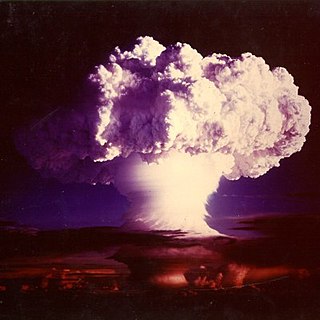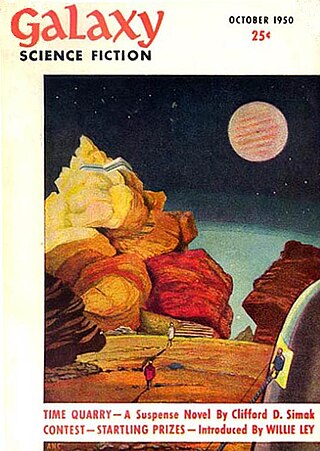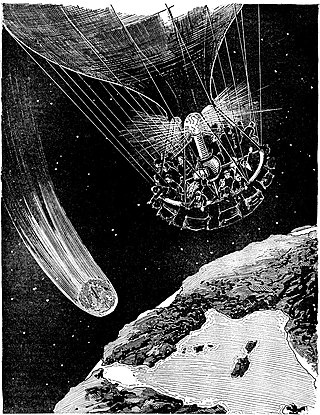The technological singularity—or simply the singularity—is a hypothetical future point in time at which technological growth becomes uncontrollable and irreversible, resulting in unforeseeable consequences for human civilization. According to the most popular version of the singularity hypothesis, I. J. Good's intelligence explosion model, an upgradable intelligent agent will eventually enter a "runaway reaction" of self-improvement cycles, each new and more intelligent generation appearing more and more rapidly, causing an "explosion" in intelligence and resulting in a powerful superintelligence that qualitatively far surpasses all human intelligence.

Apocalyptic and post-apocalyptic fiction is a subgenre of science fiction in which the Earth's civilization is collapsing or has collapsed. The apocalypse event may be climatic, such as runaway climate change; astronomical, such as an impact event; destructive, such as nuclear holocaust or resource depletion; medical, such as a pandemic, whether natural or human-caused; end time, such as the Last Judgment, Second Coming or Ragnarök; or any other scenario in which the outcome is apocalyptic, such as a zombie apocalypse, cybernetic revolt, technological singularity, dysgenics or alien invasion.

Glen David Brin is an American science fiction author. He has won the Hugo, Locus, Campbell and Nebula Awards. His novel The Postman was adapted into a 1997 feature film starring Kevin Costner.

Science fiction is a film genre that uses speculative, fictional science-based depictions of phenomena that are not fully accepted by mainstream science, such as extraterrestrial lifeforms, spacecraft, robots, cyborgs, mutants, interstellar travel, time travel, or other technologies. Science fiction films have often been used to focus on political or social issues, and to explore philosophical issues like the human condition.
Orion's Arm is a multi-authored online science fiction world-building project, first established in 2000 by M. Alan Kazlev, Donna Malcolm Hirsekorn, Bernd Helfert and Anders Sandberg and further co-authored by many people since. Anyone can contribute articles, stories, artwork, or music to the website. A large mailing list exists, in which members debate aspects of the world they are creating, discussing additions, modifications, issues arising, and work to be done.

Foundation's Triumph (1999) is a science fiction novel by American writer David Brin, set in Isaac Asimov's Foundation universe. It is the third book of the Second Foundation trilogy, which was written after Asimov's death by three authors, authorized by the Asimov estate. Brin synthesizes dozens of Foundation-Empire-Robots novels and short stories by Isaac Asimov, Roger MacBride Allen, and authorized others into a consistent framework. Foundation's Triumph includes an appendix chronology compiled by Attila Torkos.
The concept of self-replicating spacecraft, as envisioned by mathematician John von Neumann, has been described by futurists and has been discussed across a wide breadth of hard science fiction novels and stories. Self-replicating probes are sometimes referred to as von Neumann probes. Self-replicating spacecraft would in some ways either mimic or echo the features of living organisms or viruses.
The Uplift Universe is a fictional universe created by American science fiction writer David Brin. A central feature in this universe is the process of biological uplift.

Human extinction is the hypothetical end of the human species, either by population decline due to extraneous natural causes, such as an asteroid impact or large-scale volcanism, or via anthropogenic destruction (self-extinction), for example by sub-replacement fertility.

Noon: 22nd Century is a 1961 science fiction book by Arkady and Boris Strugatsky, expanded in 1962 and further in 1967, translated into English in 1978. It is sometimes considered an episodic novel, collection of linked short stories or a fix-up as some parts had been published previously as independent short stories. It relates several stories of the 22nd century, while providing the background "feeling" for the style of life which gave birth to the Noon Universe.
George Reginald Turner was an Australian writer and critic, best known for the science fiction novels written in the later part of his career. His first science fiction story and novel appeared in 1978, when he was in his early sixties. By this point, however, he had already achieved success as a mainstream novelist, including a Miles Franklin Award, and as a literary critic.
Stellar engineering is a type of engineering concerned with creating or modifying stars through artificial means.
The use of nanotechnology in fiction has attracted scholarly attention. The first use of the distinguishing concepts of nanotechnology was "There's Plenty of Room at the Bottom", a talk given by physicist Richard Feynman in 1959. K. Eric Drexler's 1986 book Engines of Creation introduced the general public to the concept of nanotechnology. Since then, nanotechnology has been used frequently in a diverse range of fiction, often as a justification for unusual or far-fetched occurrences featured in speculative fiction.

The planetary systems of stars other than the Sun and the Solar System are a staple element in many works of the science fiction genre.

References to climate change in popular culture have existed since the late 20th century and increased in the 21st century. Climate change, its impacts, and related human-environment interactions have been featured in nonfiction books and documentaries, but also literature, film, music, television shows and video games.

Comets have appeared in works of fiction since at least the 1830s. They primarily appear in science fiction as literal objects, but also make occasional symbolical appearances in other genres. In keeping with their traditional cultural associations as omens, they often threaten destruction to Earth. This commonly comes in the form of looming impact events, and occasionally through more novel means such as affecting Earth's atmosphere in different ways. In other stories, humans seek out and visit comets for purposes of research or resource extraction. Comets are inhabited by various forms of life ranging from microbes to vampires in different depictions, and are themselves living beings in some stories.

Climate fiction is literature that deals with climate change. Generally speculative in nature but inspired by climate science, works may take place in the world as we know it, in the near future or in fictional worlds experiencing climate change. The genre frequently includes science fiction and dystopian or utopian themes, imagining the potential futures based on how humanity responds to the impacts of climate change. The genre typically focuses on anthropogenic climate change and other environmental issues as opposed to weather and disaster more generally. Technologies such as climate engineering or climate adaptation practices often feature prominently in works exploring their impacts on society.

Brief Answers to the Big Questions is a popular science book written by physicist Stephen Hawking, and published by Hodder & Stoughton (hardcover) and Bantam Books (paperback) on 16 October 2018. The book examines some of the universe's greatest mysteries, and promotes the view that science is very important in helping to solve problems on planet Earth. The publisher describes the book as "a selection of [Hawking's] most profound, accessible, and timely reflections from his personal archive", and is based on, according to a book reviewer, "half a million or so words" from his essays, lectures and keynote speeches.










